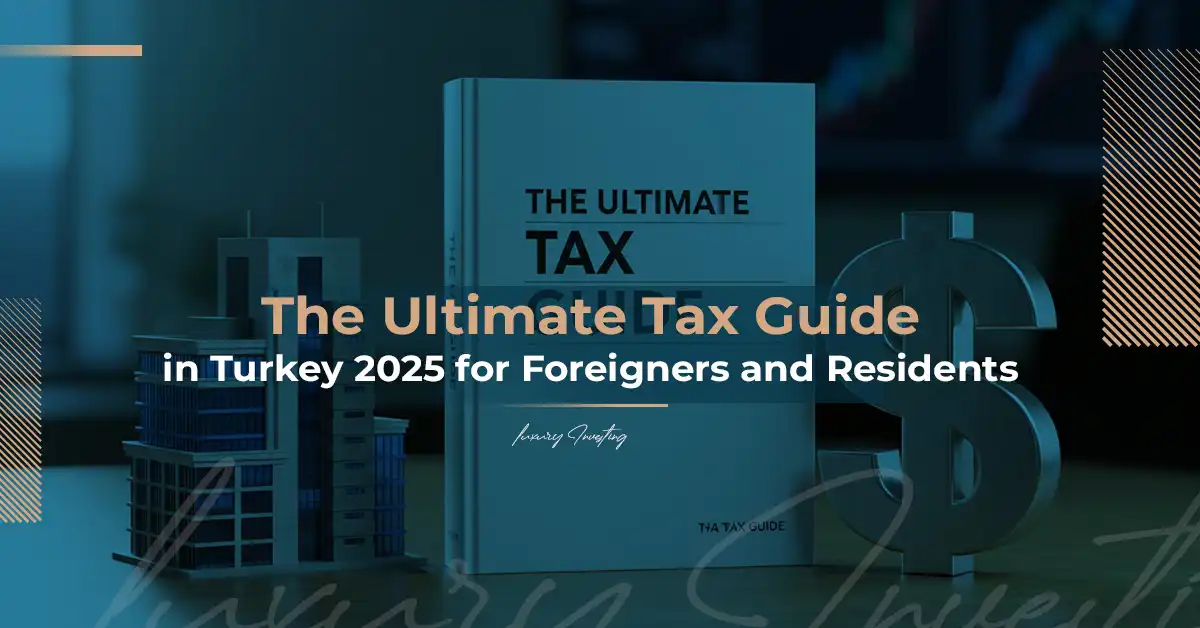
Table of Contents
The Comprehensive Tax Guide – Turkey 2025
A detailed analysis of the Turkish tax law for foreigners and citizens, focusing on tax residency, foreign assets and income, and legal exemptions.
Prepared by Luxury Signature Tax Advisory, this report provides clear guidance for investors and foreign residents regarding tax obligations and opportunities in Turkey for 2025.
Everything You Need to Know About Real Estate Taxes in Turkey for Foreign Investors
-
General Principle of Turkish Tax Law
Turkey applies the Tax Residency Principle, meaning that tax obligations are determined by residency duration, not nationality.
Anyone residing in Turkey for more than 183 days in a calendar year is considered a tax resident and is subject to income tax on their worldwide income.
-
Key Cases
- Foreign Resident (Non-Turkish Citizen)
Foreigners residing in Turkey for over 183 days are taxed on their income earned within Turkey.
Foreign income is taxed only if it is transferred or used in Turkey.
Examples:
- Apartment rent in Istanbul → taxable.
- Profit from a company in Canada not transferred → not taxable.
- Salary from a foreign company transferred to a Turkish bank → taxable.
- Naturalized Turk Living Abroad
A person who holds Turkish citizenship but resides outside the country for more than half of the year is taxed only on income generated within Turkey.
- Turkish Citizen Living in Turkey
Taxed on all domestic and foreign income.
Foreign properties are not taxed directly, but any income derived from them (such as rent or dividends) must be declared.
-
Foreign Assets and Income
Foreign properties are not subject to Turkish property tax, unless they generate income such as rent or profit, which must then be declared.
Personal savings or inactive foreign accounts are not considered taxable income unless profit is realized or transferred into Turkey.
-
Exemptions and Incentives
Main tax exemptions in Turkey include:
- Double Taxation Avoidance Treaties (DTTs) with over 85 countries.
- Exemption for foreign retirees’ pensions.
- Exemption on real estate capital gains after 5 years of ownership.
- Reduced inheritance and gift tax, ranging from 1% to 10%.
-
Real-World Scenarios
Scenario 1: A Lebanese investor living in Istanbul with an apartment rental income in Paris.
→ Taxed only if rental income is transferred to Turkey.
Scenario 2: A Canadian national who obtained Turkish citizenship but lives in Canada.
→ Taxed only on income generated in Turkey.
Scenario 3: A Turkish citizen residing in Bodrum with a Swiss bank account earning annual returns.
→ Required to declare foreign earnings as taxable income.
-
Frequently Asked Questions (FAQ)
Are funds held abroad taxed in Turkey?
No, unless they generate income and are transferred to Turkey.
Are foreign residents taxed on income earned abroad?
Yes, only if it’s brought into Turkey or used there.
Can double taxation be avoided?
Yes, through international tax treaties signed by Turkey.
How long must one stay to be considered a tax resident?
More than 183 days per calendar year.
Are foreign retirees taxed on their foreign pension?
No, as long as it’s not transferred to Turkey regularly.
-
Expert Tips from Luxury Signature
- Track your stay duration carefully to determine your tax residency.
- Use tax treaties to prevent double taxation.
- Hire a licensed accountant to file your annual income declaration.
- Plan before transferring foreign profits into Turkey.
- Keep all official bank and tax documents to verify fund sources.
-
Double Taxation and International Agreements
Double taxation occurs when the same income is taxed in two countries.
To prevent this, Turkey has signed over 85 Double Taxation Avoidance Agreements (DTAAs).
Implementation Methods:
- Exemption Method: If tax is paid abroad, the same income is exempt in Turkey.
- Credit Method: Tax paid abroad is deducted from the tax payable in Turkey.
Examples:
- Canadian investor in Istanbul earning salary from a Canadian company → taxed only in Canada.
- Russian businessman with a company in Moscow → profits remain taxable in Russia as long as they aren’t transferred to Turkey.
- Turkish citizen receiving dividends from a German bank → can offset German taxes against Turkish obligations.
Sensitive Situations:
- Income from countries without tax treaties (e.g., Syria, Iraq).
- Transferring company profits to Turkey without documentation.
- Using personal accounts for business transfers.
- Holding assets in tax havens without disclosure.
- Required Documents for Foreign Tax Credit:
- Official tax payment certificate from the country of origin.
- Turkish-translated Apostille-certified copy.
- Bank transfer records or account statements.
- Annual Turkish income declaration with attached documents.
Tips to Avoid Double Taxation:
- Keep tax certificates from your home country.
- Separate personal and business transfers.
- Work with an accountant familiar with Turkish and international tax law.
- Confirm a tax treaty between Turkey and your country before large transfers.
- Use the Yıllık Gelir Vergisi form for foreign tax deductions.
Conclusion
Turkey upholds the principle of tax fairness and avoids double taxation when foreign tax payments are proven.
However, in the absence of treaties or for undocumented transfers, it’s essential to act cautiously and consult certified tax professionals.
Understanding Turkish tax law allows investors and residents to manage their assets confidently and remain fully compliant with legal requirements.
Frequently asked questions
The tax system in Turkey is based on the principle of tax residency, meaning that taxes are levied based on the actual length of time spent in Turkey, not on citizenship.
Anyone who resides in Turkey for more than 183 days during a calendar year is considered a tax resident and is subject to income tax on all their income, both within and outside Turkey.
Yes, but only if this income is transferred to Turkey or used within the country. Income that remains outside the country is not subject to tax.
Yes, a Turkish citizen residing in Turkey is taxed on all their domestic and international income, including rent or profits earned outside Turkey.
Exemption from income tax for foreign retirees.
Exemption from property sales tax after five years of ownership. Partial exemption from inheritance and gift tax at a symbolic rate (1–10%).








